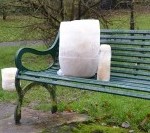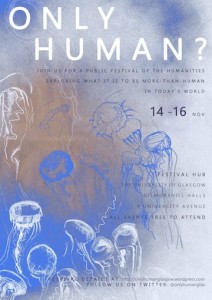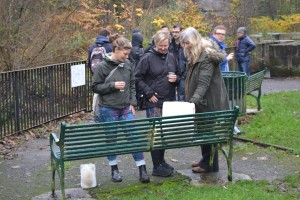
We’re only human… or are we?
What can frogs, rivers and egg collecting tell us about ourselves? These were among the questions explored through a series of events which took place in the SCCA as part of the Only Human? Festival. This was the College of Arts’ contribution to the UK’s first national festival of the humanities.
‘Only Human’, which ran from 14-16 November 2014, programmed a stimulating range of activities, including guided tours, performances, exhibitions, installations and discussions – all of them examining what it means to be more-than-human in today’s world.
By focusing on our interrelations and interactions with the more-than-human, researchers, artists and writers from film, geography, philosophy and theatre invited festival participants to learn more about everything, from a nearly extinct Hawaiian tree snail species, to water and weather-recording, architecture and islands, missing persons, family pets and gravitational fields.
To be human is to be always more-than-human – and in a context of climate crisis and environmental degradation, many researchers think it is important that we recognise and understand these inter-relationships, the things that connect us. By drawing on the diverse but related research taking place across a number of disciplines, the festival aimed to demonstrate innovative ways in which arts and humanities research helps us to think about and explore those relationships and dependencies, to consider what it is to ‘be human’ in a world with others.
Contributors to Only Human? included: Dr. Minty Donald and Nick Millar, whose ice installation, ‘Melting Species’, provoked reflection on animals’ – including humans’ – different relationships with and dependencies on water; PhD researcher, Sarah Hopfinger, who devised a piece of performance with an intergenerational cast, seeking moments of creative ‘wildness’; Dr. Simon Murray and Professor Carl Lavery, who both engaged with the agency and spectre of ruins; and, Professor Dee Heddon, who asked what lessons for sustainability we can learn from disabled people. Visiting scholar Dr. Thom van Dooren, philosopher and anthropologist from the University of New South Wales, shared material from his recent book, Flight Ways: Life and Loss at the Edge of Extinction (2014), invoking what is lost when a life form disappears from the world. The festival also featured contributions from organisations Ecoarts Scotland and NVA.
‘Melting Species’ by Minty Donald and Nick Millar. All Photographs © Bjorn Heile
Attracting more than 300 participants, the Only Human? festival demonstrated not only the School’s interest in concerns around ecology and environment but also the public’s desire to be part of the discussion.
A full programme of the Only Human? festival is available here.
Written by: Deirdre Heddon, Only Human? Festival organiser



